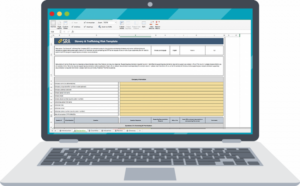Still Exploring?
Looks like you’ve been exploring our platform.
Want to see everything in one place?
 What Is the Slavery & Trafficking Risk Template?
What Is the Slavery & Trafficking Risk Template?The Slavery and Trafficking Risk Template (STRT) is an industry standard survey that manufacturers use to uncover and eliminate human rights risks across their supply chain. It helps companies meet supply chain sustainability requirements and environmental, social, and governance (ESG) goals. By using the STRT, manufacturers are better able to protect U.S. market access by surfacing supply chain links to high-risk regions, as well as reducing the risk of disruptions or fines related child labor or forced labor.
The STRT 3.2 is the most recent version of the template. Designed to be cascaded down supply chains for deep visibility into risks, the template consists of standardized questions that manufacturers use to collect human rights data from their suppliers.
The STRT Version 3.2 includes updates that further refine its role as a critical reporting tool in the fight against forced labor. This version integrates the latest global regulatory developments and user feedback to enhance traceability across all sectors at high risk of forced labor violations.
Key updates include:
 The Social Responsibility Alliance & the STRT
The Social Responsibility Alliance & the STRTThe Social Responsibility Alliance (SRA) is an initiative focused on providing companies with the tools and resources they need to achieve socially responsible supply chains. The SRA works to facilitate the collection of human rights and labor rights data, helping companies and their supply chains drive improvements in working conditions. The STRT is a free, open-source tool provided by the SRA. The STRT was developed and is maintained by the STRT Development Committee. This committee is comprised of a group of over forty organizations focused on eradicating slavery and child labor from supply chains. The Development Committee creates, updates, and maintains versions of the STRT to improve its clarity, consistency, and scoring. It also allows the committee to stay up to date with industry needs, accommodate ongoing user feedback, and improve the insights that the STRT provides.
 More Resources
More ResourcesThe Social Responsibility Alliance website offers a variety of resources to help companies complete and use the template. These resources can be accessed alongside news and other important updates. Assent supports the use of the STRT by automating data collection, validation, and analysis through our Human Trafficking and Slavery solution.
The Assent Human Trafficking and Slavery solution accepts the STRT 3.2 and collects, validates, and analyzes human-rights related data to streamline the environmental, social, and governance (ESG) programs of manufacturers all over the world. Highlights of the solution include: